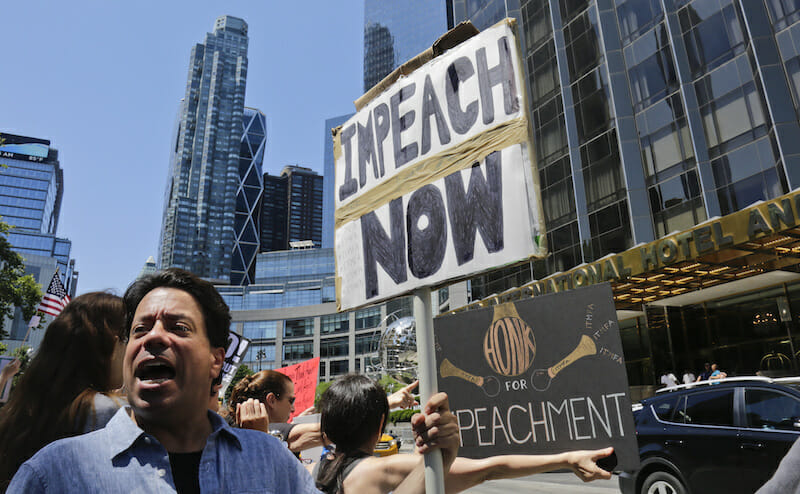History Lesson for Democrats: Think Winning Elections, Not Impeaching Trump
As a remedy for misconduct, impeachment both overpromises and underperforms—and can backfire on its proponents. Work toward winning elections instead. Protesters rally outside a Trump hotel in New York City in July to call for the impeachment of the president. (Bebeto Matthews / AP)
Protesters rally outside a Trump hotel in New York City in July to call for the impeachment of the president. (Bebeto Matthews / AP)
On a steamy day in July 1787, in the midst of the Constitutional Convention in Philadelphia, the 55 state delegates who would come to be known as the Founding Fathers turned their attention to the issue of presidential impeachment.
Many weighed in on the subject, both pro and con, but none more memorably than Benjamin Franklin, who argued that the new nation’s charter should include a means for peaceably ousting a president who had “rendered himself obnoxious.” The alternative, Franklin quipped, was assassination.
George Mason of Virginia also famously spoke out during the impeachment deliberations, asking, “Shall any man be above justice? Above all, shall that man be above it who can commit the most extensive injustice?” In the end, all but two state delegations—from South Carolina and Massachusetts—voted to incorporate an impeachment process in the Constitution.
As Harvard history professor Jill Lepore observed in an online New Yorker magazine column last May, Mason’s query about whether anyone, including the president, is above the law “was as good a question then as it is now.” It’s the crucial question at the heart of the debate today over the possible impeachment of Donald Trump, our 45th president.
According to a recent Quinnipiac University poll, 71 percent of registered Democrats believe Trump has committed impeachable offenses. They want party leaders to initiate impeachment proceedings if the Democrats retake the House in November.
Nor is the impeachment fervor among Democrats and other Trump resisters likely to abate soon. If anything, it will probably build, fueled by the president’s unhinged temperament, narcissism and pathological lying—a toxic brew that has produced a policy agenda marked by racism and know-nothing nativism, unrelenting attacks on judges and the media, a dangerous denial of climate change and the transformation of the presidency into what some commentators charge is little more than a closely held kleptocracy.
The demand for impeachment will also be sustained by the many scandals and controversies that have plagued the Trump administration since its inception. Although the specific outrages tend to ebb and flow with the phases of the moon, several should have staying power till November and beyond. Topping the list are the mushrooming investigation of Trump’s hapless personal attorney, Michael Cohen; the president’s persistent prevarications about the pre-election hush money paid to porn star Stormy Daniels; and, above all, the looming final showdown with special counsel Robert Mueller.
But playing the impeachment card—especially now, ahead of the elections—may not be the best way forward, even with a president as unfit as Trump. If the history of impeachment in America teaches anything, it’s that impeachment can backfire on its proponents. As a remedy for misconduct, it both overpromises and underperforms.
Since the ratification of the Constitution, the House has impeached a scant 19 individuals: 15 federal judges, one Cabinet member, one senator and two presidents—Andrew Johnson and Bill Clinton. Richard Nixon, the president most Americans associate with impeachment for his role in covering up the Watergate burglary, was never actually impeached. He resigned from office after the House Judiciary Committee passed three articles of impeachment against him but before the entire body voted on them.
Ironically and sadly, to invoke Franklin and the founders again, four American presidents—Abraham Lincoln (1865), James Garfield (1881), William McKinley (1901) and John F. Kennedy (1963)—have been assassinated.
In its history, the Senate has conducted 16 impeachment trials, netting convictions of eight judges, who were subsequently removed from the bench. Every other impeachment case either resulted in the dismissal of charges or an acquittal by the Senate.
The reason for the low numbers has much to do with the unique two-step impeachment process the framers crafted. Instead of designing impeachment as a straightforward legal proceeding that would be litigated in the courts and subject to judicial review, they created a hybrid of law and politics to be overseen and carried out in phases by the two chambers of Congress.
As set out in the Constitution, an impeachment case officially begins with an accusatory phase and the adoption of at least one article of impeachment by the House on a simple majority vote. Technically, impeachment refers only to the passage of an accusation, not to the subsequent trial of an accused official in the Senate.
As the accusatory body, the House has the authority to decide what constitutes an impeachable offense in any particular instance. The Constitution provides only general guidance, defining the grounds for impeachment as “treason, bribery and other high crimes and misdemeanors.”
While treason and bribery are clear enough, the meaning of “high crimes and misdemeanors”—the ground most commonly invoked over the decades—is not. In Federalist (Paper) No. 65, Alexander Hamilton described the concept as embracing not only criminal conduct but also abuses of power and violations of the “public trust.” On a more comical but still instructive note, in 1970 then-minority leader Gerald Ford, frustrated by his unsuccessful bid to impeach liberal Supreme Court Justice William O. Douglas, remarked during a floor debate, “An impeachable offense is whatever a majority of the House of Representatives considers it to be at any moment in history.”
In practice, both Hamilton and Ford have been proved correct, as charges of high crimes and misdemeanors have been alleged in impeachment cases for a dizzying array of wrongdoing, both criminal and noncriminal, particularly against judges. The annals of impeachment include two federal judges who were impeached and removed for holding court while drunk, the first in 1803 and the second in 1873. Another judge was impeached and dismissed in 1933 for running a private law practice as a side business while serving as a judicial officer.
Given the broad discretion accorded to the House, drafting articles of impeachment against Trump is easy. In fact, they’ve already been drafted. In November, Rep. Steven Cohen, D-Tenn., and six other Democrats introduced H. Res. 621, charging Trump with obstruction of justice stemming from the firing of former FBI Director James Comey, violations of the foreign and domestic emoluments clauses of the Constitution for using the presidency for personal financial gain, and abuse of power for undermining the rule of law and attacking the independence of the judiciary and the press. Proponents need only update the resolution to keep it current.
But even with a new Democratic majority come November, getting the full House to endorse the resolution would be a daunting task, requiring lengthy committee hearings and divisive debates. The second step of the impeachment process, which takes place in the Senate, would present even more daunting obstacles.
Once forwarded to the Senate, an impeachment article functions like a grand jury indictment. The president, much like a criminal defendant, is put on trial, with a team of House managers presenting the case for impeachment and a team of defense attorneys representing the president.
The Constitution vests the Senate with the sole power to try an impeachment case. And although the Constitution requires the chief justice of the Supreme Court to preside in an impeachment trial of the president, the Senate gets to decide, according to its internal procedural rules, whether to hold a full evidentiary hearing before its entire membership, as was done with the impeachment of Andrew Johnson, or to farm out the gathering of evidence to a subcommittee, as for Bill Clinton.
Conviction requires a two-thirds vote of the Senate, and removal from office follows upon conviction. A tally of less than two-thirds constitutes an acquittal. And no matter how the Senate votes, there is no appeal from its judgment, whether based on the evidence or purely on politics.
Given the two-thirds rule and the paucity of presidential impeachments, it’s difficult to discern a reliable impeachment template for the Democrats to follow that would conclude with Trump’s conviction and removal.
The House passed 11 articles of impeachment against Johnson, a Democrat reviled for his opposition to Reconstruction and the 14th Amendment, by overwhelming margins, based largely on his firing of Edwin Stanton, Lincoln’s last secretary of war. Yet, at the conclusion of an 11-week impeachment trial that featured testimony from 25 prosecution and 16 defense witnesses, seven Republican senators crossed party lines and voted for acquittal.
Clinton, cited for lying under oath about his relationship with White House intern Monica Lewinsky, also survived impeachment. He not only remained in office, but his popularity soared after the Republican-controlled House returned two articles of impeachment against him in December 1998.
Even Nixon, whose resignation in the face of near certain impeachment for obstruction of justice most closely parallels the case that could be constructed against Trump, offers only the faint outlines of a model for today’s more fractured political landscape. The Republican Party of the 1970s, which eventually abandoned Nixon, is a far cry from the grab bag of unprincipled zealots that currently dominates the Senate. In any impeachment crisis, the party would no doubt hold fast behind Trump. Nor is Trump capable of the kind of shame and self-reflection that finally led Nixon to give up the White House.
None of this means, of course, that calls for Trump’s impeachment should abruptly end, or that those who insist, as the founders did so long ago, that no one is above justice, should give up the fight.
What it means, in the simplest terms, is that those who see Trump as a threat to constitutional norms and values should concentrate less on the long shot of impeachment and more on winning elections by promoting a positive vision for the future, built around programs to advance the interests of ordinary people. That’s another political remedy for the removal of “obnoxious” leaders that the founders—white men of wealth who operated in an era when others were excluded from the franchise—didn’t much consider in 1787.
It’s by no means certain that the Democrats will be up to the challenge after blowing the last election so epically. But starting in November and continuing in 2020, they—and we—will have another chance.
Your support matters…Independent journalism is under threat and overshadowed by heavily funded mainstream media.
You can help level the playing field. Become a member.
Your tax-deductible contribution keeps us digging beneath the headlines to give you thought-provoking, investigative reporting and analysis that unearths what's really happening- without compromise.
Give today to support our courageous, independent journalists.









You need to be a supporter to comment.
There are currently no responses to this article.
Be the first to respond.